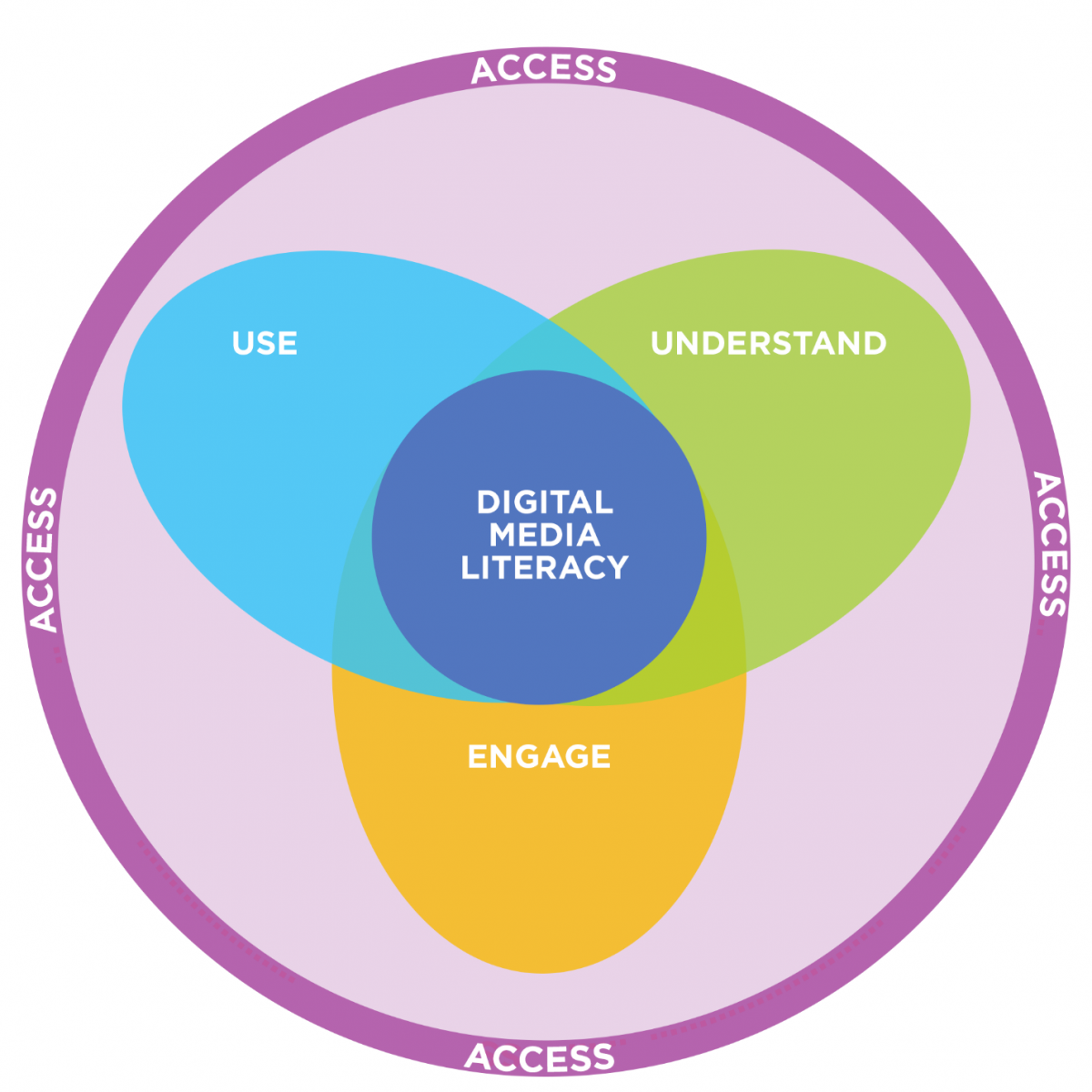Digital Media Literacy Core Competencies
This model[2] illustrates the many interrelated elements that fall under the digital literacy umbrella. These range from basic access, awareness and training to inform citizens and build consumer and user confidence, to highly sophisticated and more complex creative and critical literacies and outcomes.
Competencies for digital media literacy can be classified according to four main principles: Access, Use, Understand and Engage.

Access can be considered a precondition of digital media literacy, as it is impossible to be media literate without affordable and reliable internet access. For this reason, in the model it forms the base on which all of the other skills depend. However, there are also access skills involved in safely and ethically finding and navigating media. These includes the technical skills needed to access online content, as well as an understanding of how algorithms and other aspects of media technology determine what content we access and how; being able to navigate networked media using hyperlinks, search engines and databases; knowing about copyright-free content and being able to exercise user rights under Fair Dealing; and specialized access skills such as finding free or low-cost internet service or using screen readers.
Use represents the technical fluency that is needed to safely and effectively use media, computers and the internet. Skills and competencies that fall under use include using tools and platforms such as cameras, word processors, web browsers, social networks and media-making apps; using media tools in ways that promote positive physical and mental health and mitigate risks to health and safety; managing the distractions of networked media, which are never more than a click away; and balancing the challenges and advantages of digital media tools.
Understand is the critical piece – it’s the set of skills that help us comprehend, contextualize and critically evaluate digital media so that we can make informed decisions about what we do and encounter online. These are the essential skills that we need to start teaching kids as soon as they go online. Understand includes recognizing how networked technology affects our behaviour and our perceptions, beliefs and feelings about the world around us. Understand also prepares us for a knowledge economy as we develop – individually and collectively – information management skills for finding, evaluating and effectively using information to communicate, collaborate and solve problems.
Engage is the ability to make and use media tools to express yourself and participate in online and offline communities. Engaging with digital media is more than knowing how to use a word processor or write an email: it includes being able to adapt what we produce for various contexts and audiences; create and communicate using rich media such as images, video and sound; reflect on the social and political implications of media and use media tools for community engagement and social activism; and effectively and responsibly engage with Web 2.0 user-generated content. The ability to engage using digital media ensures that Canadians are active contributors to digital society.[3]
[1] Combes, B. (2010). How much do traditional literacy skills count? Literacy in the 21st century & reading from the screen. http://www.slideshare.net/IASLonline/literacy-skills-challenged
[2] This figure is inspired by models from the Report of the Digital Britain Media Literacy Working Group. (March 2009), DigEuLit – a European Framework for Digital Literacy (2005), and Jenkins et al., (2006) Confronting the Challenges of Participatory Culture: Media Education for the 21st Century. http://www.newmedialiteracies.org/files/working/NMLWhitePaper.pdf
[3] Steeves, Valerie, Samantha McAleese, Kara Brisson-Boivin. (2020). “Young Canadians in a Wireless World, Phase IV: Talking to Youth and Parents about Online Resiliency.” MediaSmarts. Ottawa.
